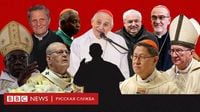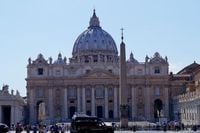The Vatican is preparing for the funeral of Pope Francis, who died on the morning of April 21, 2025. The attention of the world community is drawn to the city-state as ceremonies that have been going on for centuries take place behind closed doors. One of the central traditions is the destruction of the Pope's ring, known as the Ring of the Fisherman. This ring is traditionally destroyed with a hammer to prevent document forgery. After the death of the pontiff, the ring is destroyed by the camerlengo, the cardinal responsible for the finances and property of the Papal See. In this case, the ring will be broken with a hammer by Irishman Kevin Joseph Farrell, appointed by Francis to this position in 2019.
Traditionally, pontiffs are buried in three nested coffins made of cypress, zinc, and oak. However, Pope Francis requested to be buried in a simple wooden coffin, covered with zinc. He also refused another tradition: coins and decrees issued by the Pope will not be placed in the coffin. Instead, Francis asked to be buried in the Roman Basilica of Saint Mary Major, a church he regularly visited before trips abroad. He will become the first pope in 100 years to be buried within the Vatican; the last such exception was Leo XIII, who died in 1903 and was buried in the Basilica of Saint John Lateran on the Lateran Hill.
As the Vatican mourns the loss of its leader, attention is also turning to the future of the Catholic Church. A conclave will gather in May 2025, where over 100 cardinals will decide who will become the next Pope. Theoretically, any man baptized in the Roman Catholic Church can become Pope. However, since 1378, popes have been elected exclusively from the ranks of cardinals. The nationality of the candidate plays a significant role in the election, with the majority of popes historically being Italian.
Among the frontrunners is Cardinal Pietro Parolin, 70, who has served as the Vatican's Secretary of State since 2013. He has worked to improve relations with Vietnam and China, notably signing an agreement in 2018 regarding the appointment of bishops, which attracted both praise and criticism. Parolin's high-ranking position and diplomatic experience make him a strong candidate, especially as he is familiar with the inner workings of the Vatican and has maintained a close connection with the late Pope Francis.
Another notable candidate is Cardinal Matteo Zuppi, 69, the Archbishop of Bologna. Known for his progressive views, Zuppi has been an advocate for LGBTQ+ rights and has worked on social justice issues. He was appointed as the Vatican's peace envoy to Ukraine in 2023 and is seen as a candidate who could bring a more liberal perspective to the papacy.
Cardinal Pierbattista Pizzaballa, 60, is also in the running. As the Latin Patriarch of Jerusalem, he has experience in the Middle East and has demonstrated a willingness to engage in dialogue during crises, including offering himself as a hostage during a conflict to secure the release of children. His youth and experience make him a unique contender, although his age may be seen as a drawback.
Cardinal Peter Erdő, 72, from Hungary, represents the conservative wing of the Church. He has been vocal against same-sex marriage and has ties to Hungary's political leadership. Erdő is considered a pragmatic candidate who could appeal to both conservative and moderate factions within the Church.
Another candidate, Cardinal Luis Antonio Tagle from the Philippines, is referred to as the 'Asian Francis' and could become the first pope from Southeast Asia. He has progressive views on social issues, although he maintains traditional stances on key moral questions. His candidacy reflects the growing Catholic population in Asia, which is becoming increasingly significant in the global Church.
Cardinal Peter Turkson from Ghana is associated with the progressive wing of the Church and has been an advocate for social justice and climate issues. Meanwhile, Cardinal Robert Sarah from Guinea represents a more conservative viewpoint and has been critical of modern interpretations of Church doctrine.
As the Vatican prepares for the election of a new pope, the implications for global Catholicism are significant. The next pope will inherit a Church that is grappling with contemporary issues, including social justice, LGBTQ+ rights, and the role of women in the Church. The conclave's decision will not only affect the direction of the Catholic Church but also its relationship with various countries and communities worldwide.
The relationship between the Vatican and Belarus is particularly noteworthy in this context. Pope Francis has been an important figure for Belarus, having met with President Alexander Lukashenko in 2016. However, the relationship between the Belarusian regime and the local Catholic Church has been strained, with ongoing arrests of priests and believers. The main Catholic church in Belarus, the Red Church in Minsk, has been closed to the public for nearly three years.
Despite these challenges, there are signs of potential improvement in relations. A new apostolic nuncio will arrive in Belarus soon, and the appointment of the first Belarusian ambassador to the Vatican in January 2025 marks a significant step forward. Political scientist Natalia Vasilevich suggests that the relationship between the Belarusian regime and the Vatican is evolving, albeit slowly.
As the conclave approaches, the question of who will be the next pope looms large. Candidates like Pietro Parolin are seen as favorable for Belarus, given their understanding of the region and its complexities. The next pope's approach to Belarus could significantly influence the future of the Catholic Church in the country, which has faced repression and challenges in recent years.
In conclusion, the death of Pope Francis marks a pivotal moment for the Catholic Church, as it prepares for a new leader amid ongoing global challenges and internal debates. The upcoming conclave will not only determine the future direction of the Church but also its ability to navigate the complexities of modern society.





